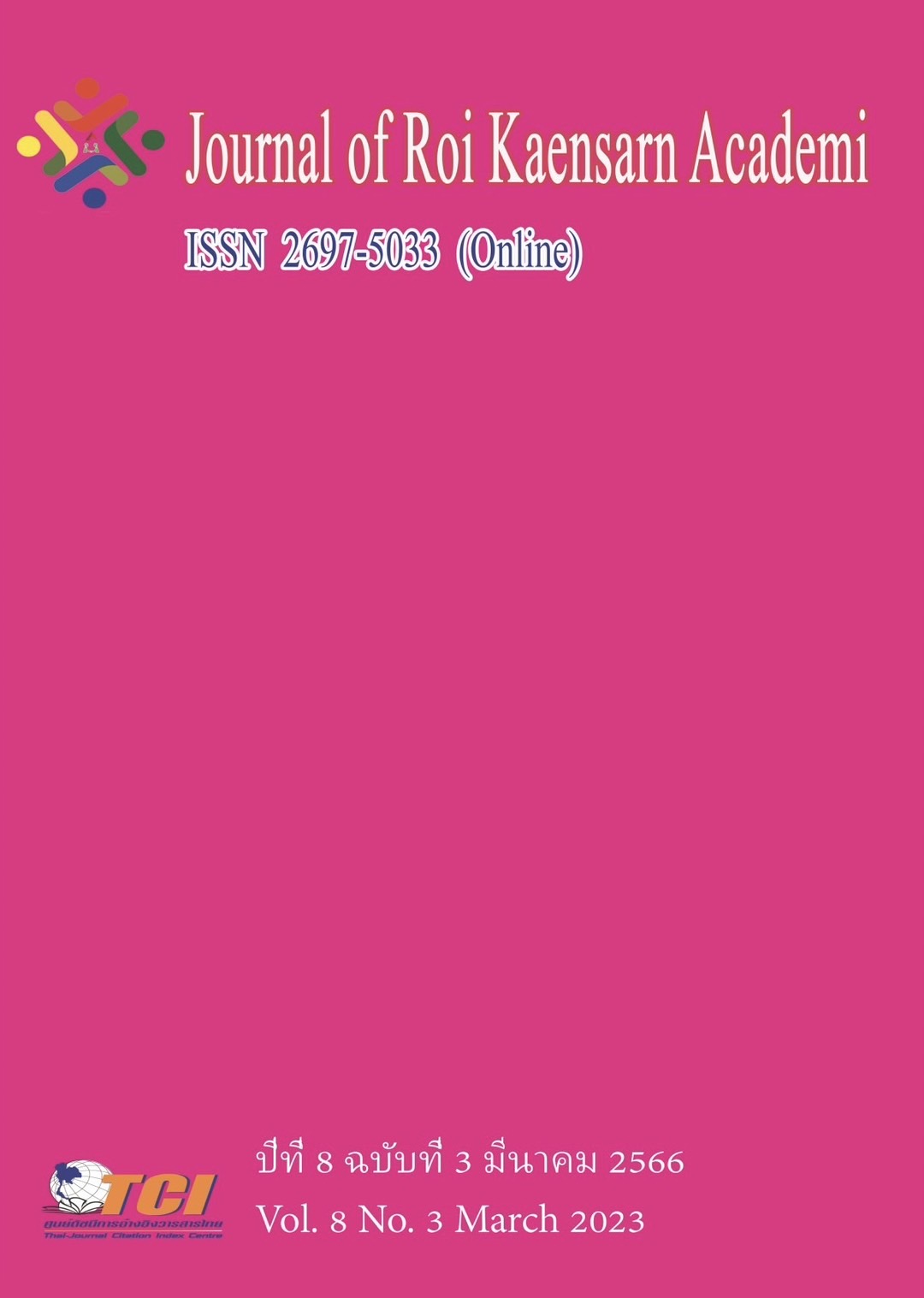การศึกษาแรงจูงใจและความวิตกกังวลที่ส่งผลต่อผลสัมฤทธิ์ด้านภาษาของผู้เรียนภาษาญี่ปุ่น : กรณีศึกษานักศึกษาหลักสูตรภาษาญี่ปุ่น และการสื่อสารมหาวิทยาลัยอุบลราชธานี
Main Article Content
บทคัดย่อ
การศึกษานี้มีวัตถุประสงค์เพื่อศึกษาแรงจูงใจและความวิตกกังวลที่ส่งผลต่อผลสัมฤทธิ์ด้านภาษาญี่ปุ่นของนักศึกษาภาควิชาภาษาญี่ปุ่นคณะศิลปศาสตร์มหาวิทยาลัยอุบลราชธานีเก็บข้อมูลกับนักศึกษาภาควิชาภาษาญี่ปุ่นคณะศิลปศาสตร์มหาวิทยาลัยอุบลราชธานีชั้นปีที่ 2 และ 3 จำนวน 145 คน โดยใช้แบบสอบถาม และ การสัมภาษณ์ชนิดกึ่งโครงสร้างเพื่อใช้ในการวิเคราะห์ข้อมูลการวิเคราะห์ทางสถิติโดยใช้สถิติเชิงพรรณนาได้แก่ ค่าเฉลี่ย ค่าส่วนเบี่ยงเบนมาตรฐาน และการวิเคราะห์สมการโครงสร้างผลการวิจัยพบว่า ผู้เรียนมีแรงจูงใจ เกี่ยวกับ “แนวโน้มในอนาคต” มากที่สุด เช่น “อยากไปศึกษาต่อญี่ปุ่น” “อยากไปทำงานที่ญี่ปุ่น” และผู้เรียน รู้สึกวิตกกังวล เกี่ยวกับ“ความวิตกกังวลเกี่ยวกับการออกเสียงและการสื่อสารภาษาญี่ปุ่น” เช่น “ฉันรู้สึกวิตกกังวลว่าตนเองจะพูดภาษาญี่ปุ่น ในห้องเรียนผิดหรือเปล่า” อีกทั้งแรงจูงใจในการเรียนภาษาญี่ปุ่น ส่งผลทางบวก ต่อผลสัมฤทธิ์ทางการศึกษา ของผู้เรียนอย่างมีนัยสำคัญทางสถิติที่ระดับ .05 และ ความวิตกกังวล ใน การ เรียน ภาษา ญี่ปุ่นส่งผล ทางลบต่อผลสัมฤทธิ์ ทางการศึกษาของผู้เรียน อย่างมี นัยสำคัญ ทางสถิติ ที่ระดับ .01
Article Details
เอกสารอ้างอิง
ชัชวาลย์ เรืองประพันธ์. (2539). สถิติพื้นฐาน. (พิมพ์ครั้งที่ 2). ขอนแก่น: โรงพิมพ์คลังนานาวิทยา
อมรรัตน์ เตวิช และเตวิช เสวตไอยาราม. (2017). การศึกษาความวิตกกังวลในการเรียนรู้ภาษาญี่ปุ่นของผู้เรียนระดับต้นที่มีพื้นฐานในภาษาญี่ปุ่นแตกต่างกันเรียนอยู่ในชั้นเรียนเดียวกัน. สมาคมญี่ปุ่นศึกษาแห่งประเทศไทย, 7 (1), 33-50
Antony, M.M., and Swinson, R.P. (1998). When perfect isn’t good enough: Strategies for coping with perfectionism. Oakland, CA: New Harbinger.
Dörnyei, Z. (1998). Motivation in Second and foreign language lerning. Language Teaching, 31 (3), 117-135.
Gardner, R. C. (1985). Social Psychology and Second Language Lerning: The Role of Attitude and Motivation. Edward Arnold London.
Gardner, R. C. and Lambert, W. E. (1959). Motivational variables in second language acquisition. Canadian Journal of Psychology, 13 (4), 266-272.
George, D., and Mallery, P. (2003) SPSS for Windows step by step: A simple guide and reference. 11.0 update (4th ed.). Allyn & Bacon.
Hair, J. F. et al. (2010) Multivariate data analysis: A global perspective (7th ed.). New Jersey: Pearson Prentice Hall.
Horwitz et al. (1986). Foreign language classrom anxiety. in The Modern Language Journal, 70 (2), 125-132.
Iizuka, H. (2006). The Relationship Between Foreign Students of a Japanese School’s
Motivations Factors and Problems of Life style. Journal of international students education (11), 179-187.
Ishibashi, R. (2013). Relationship between emotional factors related to learning Japanese and
learning achievement. For intermediate and advanced learners in a foreign language learning environment. Gakuen (876), 34-42.
Ishibashi, R. (2015). Influence of learner's emotional factors on learning Japanese--From the perspective of Japanese proficiency--. Gakuen (898), 12-21.
MacIntyre, P. D., and Gardner, R.C. (1994a). The effects of induced anxiety on three stages of cognitive processing in computerized vocabulary learning. Studies in Second Language Acquisition, 16 (1), 1-17.
MacIntyre, P. D., and Gardner, R.C. (1994b). The subtle effects of language anxiety on cognitive processing in the second language. Language Learning, 44 (2), 283-305.
Motoda, S. (1999) An Empirical Study on Second Language Anxiety among Beginners of Japanese Journal of the Japan Society for Teaching Japanese as a Foreign Language 21(4), 45-52.
Motoda, S. (2000) Measurement of Second Language Anxiety in the Target Language
Environment : The Japanese Language Anxiety Scale-Test Construction, Reliability, and Validity. The Japanese journal of educational psychology, 48 (4), 422-432.
Motoda, S. (2005A) The Relationship between Second Language Anxiety and Motivation
among Japanese Language Learners. The bulletin of Japanese curriculum research and development 28(3), 73-82.
Motoda, S. (2005B) Theory and Reality of Second Language Anxiety. dainigengofuan no riron to jittai (in Japanese). Hiroshima: Keisuisha Co., Ltd.
Narita, T. (1998). Relationship between Japanese Language Learning Motivation and Grades-For Thai University Students. Japanese Language Education in the World. Japanese Language Education Theory (8), 1-11.
Nishitani, M. and Matsuda, T. (2003). Anxiety due to studying a foreign language for Vietnamese students learning Japanese. Hitotsubashi University Center for Student Exchange Journal (6), 77-89.
Nuibe, Y. et al. (1995). Interanational Survey on University Student Motivation--In Case of Victoria University in New Zealand--. Journal of Japanese language teaching (86), 162-172.
Tomiyoshi, Y. (2014). Qualitative Survey on Factors Influencing Learning Motivation of Japanese Language Students: In the Context Surrounding Japanese Major Students in Central Thai University P in Thailand. Obirin Gengo Kyoiku Ronso (10), 39-54.
Utsugi, T. (2011). Relationship between Japanese Language Proficiency and Motivation forLearning Japanese Language--For Thai University Students. International Foundation Bangkok Japan Cultural Center Japanese Language Education Bulletin (8), 65-74.
Yamazaki, A. (2005). Gakushushayoin -gakushusha no kojinsa to daini gengo gaku shusha- (in Japanese). The journal of Environmental and Information Studies Tokyo City University, 6 (1), 90-96.

